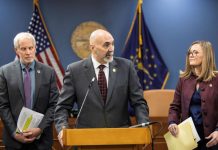The information that follows summarizes some of the current issues in the areas of estate, tax and personal and business planning which may be of interest to you. Although this information is accurate and authoritative, it is general in nature and not intended to constitute specific professional advice. For professional advice or more specific information, please contact my office.
Federal Estate Tax Exclusion Increase. The federal estate tax exclusion amount for decedents dying during 2016 will be $5.45 million, an increase from the $5.43 million exemption amount for 2015. The annual gift tax exclusion amount on a per donee basis will remain at $14,000 for 2016. The effect of the increase in the federal estate tax exclusion amount is that, in the case of a husband and wife, the two spouses together can have a total of $10.9 million at the time of the two deaths and not pay any federal estate tax. Obviously, the federal estate tax is no longer an issue for more than 99 percent of American taxpayers. The gift tax (per donee) annual exclusion amount of $14,000, as discussed in previous issues of this newsletter, is a concept which is vastly misunderstood. Many people think that gifts in excess of that amount will result in a gift tax actually being paid, but that is usually not true. The gift tax exclusion applicable to taxable gifts over a person’s lifetime is “unified†with the federal estate tax exclusion amount, which means that total gifts of $5.45 million could be made in excess of the cumulative $14,000 annual “per donee†exclusions without paying any gift tax. The gift tax is imposed on the donor of the gift, not the donee. Gifts are non-taxable for income tax purposes. Consequently, for most people, gifts of any amount can be given without any immediate tax consequences. For those who may be subject to the federal estate tax, cumulative “taxable gifts†in excess of the annual $14,000 “per donee†exclusion amounts will reduce the federal estate tax exemption amount, so that the federal estate tax exemption amount will be reduced by the same amount that a person uses of his or her cumulative federal gift tax exclusion amount of $5.45 million in 2016.
Deductions For LTC Insurance Increase. The deductible amount that taxpayers with qualified long term care insurance can claim as deductions on their individual returns has been increased for 2016. The maximum amount is as follows:
Age
40 or less
More than 40 but not more than 50 More than 50 but not more than 60 More than 60 but not more than 70 More than 70
(Continued on Reverse Side)
Maximum Deduction for 2016
$390
$730 $1,460 $3,900 $4,870
Only the amount paid is deductible. If the premium is higher, the maximum deduction is the amount indicated for the age group shown.
Medicaid Figures Not Likely To Change. Because the September 2015 Consumer Price Index for All Urban Consumers (CPI-U) is actually lower than the September 2014 factor, most commentators believe that the spousal impoverishment figures applicable in the context of Medicaid will not increase. This would mean that the maximum community spouse resource allowance (CSRA) for 2016 would remain at $119,220, with a minimum of $23,844. The maximum income standard (called the “monthly maintenance needs allowanceâ€) would remain at $2,980.50 per month, and the income cap applicable to a Miller trust (also called a “qualified income trustâ€) would remain at $2,199. The home equity limit would also remain unchanged at $552,000 (which in states allowing a larger amount could not exceed $828,000). Please refer to previous issues of this newsletter for discussions relating to the community spouse resource allowance, how the allowance is determined, and some of the distinctions between “countable†assets and “exempt†assets which enter into the calculation.
Legal Advice For Health Care Advance Directives. A recent article in the “To Your Good Health†column in the Evansville Courier & Press contained simplistic and misdirected comments. I was writing health care advance directives before there was even a statutory basis for them, and I have dealt with them in innumerable client situations. The suggestion was made that a lawyer “may be helpful†for estate planning, but that they were not needed for health care advance directives. In fact, an attorney is as essential to estate planning as a surgeon is to a surgical procedure. Often the legal estate planning processes are much more complex than surgical processes. It is entirely incorrect even to suggest that an attorney is not needed for health care advance directives. Most of my physician clients do not fully understand health care advance directives, and there are many myths and misunderstandings associated with them, as is the case with many legal issues and concepts. I find it interesting that it is often said that a person should consult with a physician even before taking an aspirin. For anyone to suggest that an attorney is not needed during the course of a process as important as understanding and implementing correct health care advance directives is a canard as well as a disservice to the general public. While it may be correct to state that many people implement health care advance directives without the advice of legal counsel, it is not correct to state or suggest that it is a good idea. I have written thousands of health care advance directives, and read tens of thousands more, and I am of the firm opinion that the vast majority of health care advance directives are either written incorrectly, or implemented improperly, and are rarely understood fully. I would encourage readers of this newsletter to refer to previous issues addressing health care advance directives. When I meet with my clients to discuss estate and asset protection planning issues, one of the most important areas of discussion is “lifetime planning†involving powers of attorney and health care advance directives. We spend a reasonable amount of time discussing those concepts so that I can explain them to people and be sure that they understand them. I know from my vast experience that most people do not.
Additional Information. Future issues of this Newsletter will address other issues of current interest. Please contact my office with any questions that you might have.




